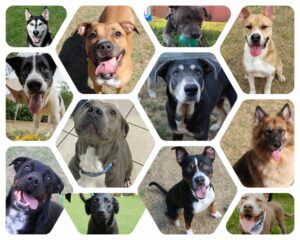Getting a dog is exciting! It’s also a long-term commitment. If you’re considering a new animal (esp. if it’s a birthday or holiday present), remember to treat him or her as a life-long gift that requires food, time, love, exercise, attention and medical care. 
Not sure if having a dog will fit into your life? We’re sharing some tips and checklists for new pets, whether they are young or older. If they’re new to your home, there are things to consider:
- Size and breed – is it compatible with your lifestyle? How much exercise will it need? How much time can you and your family or roommates commit each day? Is there a safe place to walk the dog each day?
- Age – yours and the dog’s; a senior animal may only have a few years remaining but a puppy or young dog may live 10, 12 or 15 years. Are you ready for that kind of commitment?
- Cost – what is your initial financial investment, such as an adoption fee, and monthly budget for pets?
- Altered – is the dog or cat spayed/neutered? If not, factor that into your budget. The best way to control the overpopulation of dogs and cats is to get them spayed and neutered.
- Kiddos – do you have young children or are you planning to have them? Be sure to find a breed (and age) that will mesh with small kids.
- Other pets – some animals do much better as the star of the show without other pets around. Others can fit right into a home with multiple animals. Check in advance on the breed, age, temperament, and compatibility of the dog.
- Noise – some breeds won’t make good neighbors in tight spaces, like apartments. Certain types of dogs bark a lot, which may not be a good situation for you and your fellow apartment dwellers.
- Rent/Own – check with your landlord if you don’t own your home. Know which breeds and sizes are allowed at your location. If you own a home, check with your insurance provider just to be safe.
- Space – is there room both inside your home and a place for a dog to run and play outside? Where would you put a crate or bed?
- Moving to a new place – know the rules at the new location and try to find a place that allows pets; avoid having to rehome an animal that is part of your family.
- Boarding – who will watch Rex or Fluffy when you’re out of town? Factor that cost into your budget.
Also consider these costs, several of which are monthly/ongoing:
Food & water
Vet bills & emergency care
Vaccinations and supplements (possibly medications)
Crates & gates
Collars, tags & leashes
Shampoo & flea meds (also heartworm prevention)
Beds & toys
Bowls & brushes
And if you aren’t ready for the cost and commitment of a dog, but want to do something good for the many, many dogs in the San Marcos Regional Animal Shelter, some ideas include;
Donate – the shelter accepts monetary donations year-round, as well as special items as needed.
Foster – help an animal recover from surgery or just provide a safe, loving space while the pup is awaiting his or her forever family. Shelters are loud and stressful. By fostering you can help a future family better understand the pup they’re adopting.
Educate – share all of the important information about the shelter and its mission with your friends and social networks.
Volunteer – the shelter needs community support year-round; you can walk dogs, clean kennels, and provide other assistance.
See more tips and info on the following website: (Hays County does not endorse or have any financial relationship with this company – we just think there’s some great info in this guide for potential pet owners.) https://loom.ly/nQnmXvI
